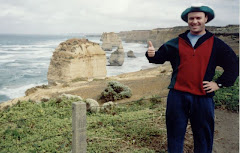sábado, 11 de setembro de 2010
Jokes - 11
Two cows are standing in a field.
One says to the other "Are you worried about Mad Cow Disease?"
The other one says "No, It doesn't worry me, I'm a horse!"
One says to the other "Are you worried about Mad Cow Disease?"
The other one says "No, It doesn't worry me, I'm a horse!"
Grammar - Some x Any
Grammar Topics
Some x Any
- Some – use geralmente em –> Frases Afirmativas + Perguntas Polidas
- Any – use geralmente em –> Frases Negativas + Perguntas
1- SOME:
‘Some’ significa algum, alguns, alguma, algumas e deve ser usado em afirmações.Exemplos:
Some people never give up their dreams.Em alguns casos, quando estiver junto com um substantivo incontável, uma boa tradução para ’some’ pode ser ‘um pouco de’.
(Algumas pessoas nunca desistem dos seus sonhos.)
There are some over there.
(Há algumas logo ali.)
I drank some wine at the party yesterday.Use ’some’ em Perguntas Polidas, isto é, aquelas em que você deseja ou precisa ser mais formal. Você deve fazer isso quando oferecer algo a alguém, já que ‘any’ tem uma certa carga negativa.
(Eu bebi um pouco de vinho na festa ontem.)
Então, usar ‘any’ em uma pergunta para oferecer algo a alguém não é muito educado. É como em português. Tem aquela idéia de que não se deve oferecer um cafezinho a alguém usando a palavra não na pergunta, assim:
Você não aceita um cafezinho?- pois ao usar o ‘não’ na pergunta, você está induzindo a pessoa a não aceitar. Da mesma forma, não use ‘any’ na pergunta para oferecer algo a alguém. Use ’some’:
Would you like some coffee?
(Você gostaria de ‘algum‘ café? -> a tradução literal ‘algum’ não fica boa aqui, certo? Também não me agrada muito a tradução ‘Você gostaria de ‘um pouco de’ café?, porque parece que você está ofereceno *apenas* um pouco de café (sendo sovina!) - e não costumamos falar assim no Brasil. Então, podemos entender melhor se simplesmente não usarmos o ‘algum’, pois não é essa a idéia em português, e sim: Você aceita um cafezinho? )
2- ANY:
Nas negativas, pode significar nenhum ou nenhuma:I don’t have any friends in Australia.Any pode significar qualquer. Nesse caso, geralmente, é enfatizado na fala.
(Eu não tenho nenhum amigo na Austrália.)
There aren’t any pens here.
(Não há nenhuma caneta aqui.)
She is so elegant that any jeans will surely look good on her.Nas perguntas, significa algum, alguma, alguns, algumas. Muitas vezes, em português, simplesmente não usaríamos nenhum pronome nesses casos, ou, outras vezes, usaríamos o singular. Portanto, procure acostumar-se a usar ‘any’ em interrogações em inglês e a adaptar a tradução, caso seja necessária
(Ela é tão elegante que qualquer calça jeans certamente ficará bonita nela.)
Do you have any brothers and sisters?
(Você tem (alguns) irmãos e irmãs?)
Are there any good restaurants near here?
(Há algum bom restaurante aqui perto?
ou ainda: Há (alguns) bons restaurantes aqui perto?)
Test your understanding by doing some exercises on these links:
http://a4esl.org/q/h/0001/jb-someany.html
http://www.englisch-hilfen.de/en/exercises/confusing_words/some_any2.htm
http://www.better-english.com/easier/someany.htm
http://www.englishexperts.com.br/forum/some-x-any-x-no-t7550.html
20,000 Leagues Under the Sea - Book
Book of the Week
20,000 Leagues Under the Sea
by Jules Verne
Twenty Thousand Leagues Under the Sea (French: Vingt mille lieues sous les mers) is a classic science fiction novel by French writer Jules Verne, published in 1870. It is about the fictional Captain Nemo and his submarine, Nautilus, as seen by one of his passengers, Professor Pierre Aronnax.
To download the book, use this link:
http://www2.hn.psu.edu/faculty/jmanis/julesverne/20000leagues.pdfFor a review over this book, click on this link:
http://lib.store.yahoo.net/lib/monkeynote/pmTwentySample.pdfTo listen to this story from an audio book, use one of these links:
http://librivox.org/twenty-thousand-leagues-under-the-sea-by-jules-verne/http://www.audiobooksforfree.com/download/default.asp?refnum=1000117
Cookies - Recipe of the Week
Recipe of the Week
Chocolate Chunk Cookies
This Chocolate Chunk Cookie recipe comes from an excellent book The Sweeter Side of Amy's Bread, which features sweet treats from the very popular New York bakery, Amy's Bread. The baking soda used in this recipe aids in the browning of the cookies plus counteracts the acidity of the brown sugar. Chunks of semi sweet chocolate are used instead of chocolate chips to give these cookies a more intense chocolate flavor. You can use any combination of bitter, semi sweet or white chocolate or even those delicious toffee bits. These cookies are giant sized, but if you want to make smaller cookies, keep in mind you will have to reduce the baking time.
sized, but if you want to make smaller cookies, keep in mind you will have to reduce the baking time.
Chocolate Chunk Cookies: Preheat oven to 350 degrees F (177 degrees C). Place one oven rack in the top third of the oven, and one oven rack in the bottom third of the oven. Line two baking sheets with parchment paper.

Chocolate Chunk Cookies: Preheat oven to 350 degrees F (177 degrees C). Place one oven rack in the top third of the oven, and one oven rack in the bottom third of the oven. Line two baking sheets with parchment paper.
In a large bowl, whisk together the flour, baking soda, and salt.
In the bowl of your electric mixer (or with a hand mixer), beat the butter and sugars until light and fluffy (about 2 - 3 minutes). Scrape down the sides of the bowl. Add the egg and egg yolk, beating until well combined. Beat in the vanilla extract.
Gradually add the flour mixture to the creamed mixture and beat just until incorporated. Scrape down the sides of the bowl as needed. Stir in the chocolate chunks.
Form dough into balls, using 1/4 cup (55 grams) for each cookie. Place six balls of dough on each baking sheet. Gently flatten each ball of dough into a 2 1/2 inch (6.5 cm) round. Bake the cookies for about 15-17 minutes, rotating the baking sheets halfway through the baking time. The cookies are done when they are light golden brown in color and just set. They will still seem a little soft but they will firm up as they cool. Remove from oven and let the cookies cool a few minutes on the baking sheet before transferring them to a wire rack to cool.
before transferring them to a wire rack to cool.

Makes about 18 large cookies.
Chocolate Chunk Cookies:
2 cups (260 grams) all purpose flour
1 1/4 teaspoons baking soda
1/4 teaspoon salt
3/4 cup (170 grams) unsalted butter, room temperature
2/3 cup (130 grams) granulated white sugar
2/3 cup (140 grams) firmly packed light brown sugar
1 large egg
1 large egg yolk
1 1/4 cups (210 grams) chocolate chunks (can use chocolate chips)sábado, 4 de setembro de 2010
Jokes - 10
Who Should I Marry?
The daughter asks her mother for advice:- Mother, I can't make up my mind whether I should marry a military, a lawyer or a teacher...
- My dear, marry the military, these people are used to cooking, making their beds and obey orders.
Vocabulary Help
- daughter - filha
- advice - conselho
- lawyer - advogado
- used to - acostumados a
- cook - cozinhar
- make their beds - arrumar suas camas
- obey orders - obedecer ordens
Miss x Lose - Grammar
Topics on Grammar
Miss x Lose
Ambos significam 'perder' em português, o que difere um do outro é o uso. Veja os exemplos:
1) Usa-se 'miss' (verbo regular; passado 'missed'):
perder uma aula, um curso, uma oportunidade, uma chance, uma reunião/encontro, um meio de transporte - ônibus, trem, voo [miss a class, a course, an opportunity, a chance, a meeting/a date, a bus, train, plane/flight]
sentir falta ou saudade de alguém ou alguma coisa (miss somebody or something).
errar a pontaria, a mira, o alvo, a saída de uma autoestrada.
2) Usa-se 'lose' (verbo irregular; passado 'lost'):
perder algum objeto (um relógio, dinheiro, uma chave) [lose an object - a watch, money, a key]
perder um sentimento ou algo abstrato (memória, consciência, paciência) [lose one's memory, lose consciousness, lose one's patience/lose one's mind)
perder numa competição ou jogo (lose a competition, a championship, a game)
perder-se ("Me perdi porque eu estava sem um mapa.") ["I got lost because I didn't have a map.")
perder alguém, no sentido de a pessoa morrer. ("Fizemos todo o possível, mas ele morreu." ["We did everything we could, but we lost him."]
Mais exemplos:
"Yeah, she's lost it" = significa que a pessoa ficou louca
"It's gonna be the party of the century. You can't miss it" = significa que a pessoa não pode perder a festa; deixar de ir.
"Take your left and the library will be to your right. You can't miss it as it's a big building." = "pegue a esquerda e a biblioteca estará à sua direita. Não tem como errar porque o prédio é bem grande."
"It's been a while since I don't visit my best friend. I miss her a lot." = "Faz tempo que não visito minha melhor amiga. Sinto saudade dela."Mais dicas no site:
http://www.teclasap.com.br/blog/2010/03/11/falsas-gemeas-lose-x-miss/
Utopia - eBook
Book of the Week
UTOPIA
by Thomas More
A classic short story. Only 88 pages.
Utopia (pronounced /juːˈtoʊpiə/) is a name for an ideal community or society possessing a seemingly perfect socio-politico-legal system.[1] The word was invented by Sir Thomas More for his 1516 book Utopia, describing a fictional island in the Atlantic Ocean. The term has been used to describe both intentional communities that attempted to create an ideal society, and fictional societies portrayed in literature. It has spawned other concepts, most prominently dystopia.
Download the book from the link below:
http://www.aprendendoingles.com.br/ebooks/Utopia.pdf
Assinar:
Postagens (Atom)














